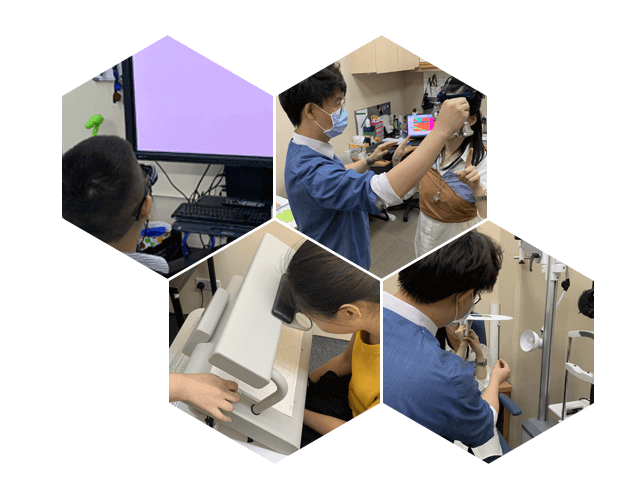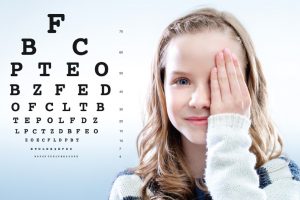Services
Having 20/20 vision simply means that an individual can clearly see a specific letter on the standard eye chart at a distance of 20 feet. However, it’s important to recognize that healthy vision encompasses much more than just achieving 20/20 clarity.
For children aged 6-18, it is advisable to undergo a comprehensive vision examination before starting school and annually during their academic years. These exams encompass evaluations of both external and internal eye health, color vision, optical prescription (refraction), and screening for functional visual abilities. Yet, when a child faces challenges with reading, learning, or falls short of their potential, a Neuro-Developmental Vision Evaluation becomes essential.
For younger children, aged toddler to 5 years, who exhibit conditions like eye turn (Strabismus, Mata Juling 斗鸡眼/斜视) or lazy eye (Amblyopia, Mata Malas 懒惰眼), scheduling a Neuro-Developmental Vision Evaluation is highly recommended. Likewise, adults experiencing reading difficulties or those who have sustained head injuries should also consider this evaluation.
In cases involving children with special needs, those on the Autism Spectrum, or individuals with other developmental delays, a Neuro-Developmental Vision Evaluation is strongly encouraged to address potential visual challenges comprehensively.
Our Neuro-Developmental Vision Evaluation extends beyond the assessment of 20/20 vision, encompassing a comprehensive evaluation of essential visual skills crucial for reading and learning, including:
1. Near Visual Acuity

Is vision sharp and singular when looking up close? Clarity at short distances is pivotal for tasks like reading, writing, close-up work, and computer usage.
2. Eye Teaming Skills

Do both eyes effectively align, track, and collaborate as a synchronized team? Impaired binocular (two-eyed) vision and coordination can lead to various challenges, including convergence insufficiency and reduced depth perception.
3. Eye Focusing Skills

Can the eyes sustain sharp vision across different distances? Swift and automatic adjustment of focus is essential for tasks like learning, reading, writing, and sports. Any shortcomings may result in visual fatigue, diminished reading comprehension, or an aversion to close work and other activities.
4. Eye Movement Skills
Do eye movements exhibit sufficient muscle control, tracking ability, and fixation skills? In an educational setting, typical eye movements facilitate swift and precise shifts of focus along lines of text or between materials like books, desks, and the board. In sports, effective eye movements play a crucial role in enhancing eye-hand coordination, visual reaction time, and precise tracking.
5. Reversal Frequency
Is the occurrence of letter or word confusion or reversal (e.g., b, d; p, q; saw, was; etc.) within age-appropriate norms? Beyond the age of seven, frequent instances of visual and written reversals may signal a visual perceptual challenge.
To comprehend the visual input received through our eyes, our brain processes this information to help us make sense of what we see. The Neuro-Developmental Vision Evaluation also assesses how effectively the brain interprets visual data.
The aforementioned assessments represent just a fraction of the many visual skills examined during our Neuro-Developmental Vision Evaluation. If your child exhibits any symptoms listed on our checklist or encounters difficulties in reading and learning, a Neuro-Developmental Vision Evaluation could potentially make a significant difference.
What is a Neuro-Developmental Vision Evaluation?
The Neuro-Developmental Vision Evaluation (NDVE) is significantly more comprehensive than a standard eye examination. It typically lasts for approximately 1 to 2 hours and is conducted on a one-on-one basis between our vision specialist and therapist and the patient. The primary objective of this assessment is to delve into how the visual system processes information, how it interacts with other sensory modalities, and whether it is enhancing or hindering the individual’s performance potential. During the evaluation, parents are kindly requested to wait in the reception area. Following the assessment, scores will be calculated and then discussed during a separate consultation session with our Behavioral and Developmental Optometrist, involving the patient and/or parents. At this time, treatment options will be thoroughly explored.
On occasion, the evaluation may extend in duration due to the complexity of the issue. Should this occur, our vision specialist will provide a comprehensive explanation during the evaluation process.
What should you take note?
As the Neuro-Developmental Vision Evaluation (NDVE) and Consultation appointments require a substantial amount of time and resources, we greatly appreciate your cooperation with our policy concerning missed appointments and last-minute cancellations. When scheduling, please ensure that your appointment does not conflict with any other commitments you may have on that day. We kindly request a 48-hour notice for cancellations of the Neuro-Developmental Vision Evaluation appointment. This advance notice allows us to accommodate other patients on our waiting list. A RM100 fee will be applied in cases of patient no-shows or cancellations made less than 48 hours before the appointment. Any charges incurred by the patient are the responsibility of the patient, parent, or guardian.
Payment Policy:
Please keep in mind that we reserve a significant amount of time, typically 40-90 minutes, with our vision specialist for your appointment. To secure your reservation, a payment of 50% of the total fee is required. Payment can be made via PayPal or local bank transfer, with bank details provided upon scheduling.
Preparing Your Child for the Evaluation:
It’s important to reassure your child that there are no right or wrong answers and that there will be no injections involved. Ensure your child is well-fed, preferably with a meal containing protein and vegetables before the evaluation. Additionally, ensure your child gets a good night’s sleep.
Avoid Bringing Additional Children:
To minimize distractions during the evaluation and maintain focus, we kindly request that you do not bring any additional children to this appointment. This will help create a conducive environment for both you and your child during the assessment.

